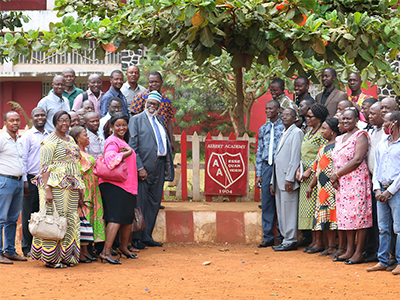After the tragic death of Sierra Leone Conference Bishop John K. Yambasu in August 2020, retired Bishop Warner H. Brown Jr. was named as interim episcopal leader.
Brown served as bishop for 20 years in the Denver and San Francisco areas and as president of the Council of Bishops. He also was a mission partner with bishops and church leaders in Africa, Europe, the Americas and Asia.
Your support of the Episcopal Fund apportionment helps pay the salaries and benefits of United Methodist Bishops and allows them to travel across their episcopal areas providing mentorship and leadership.
Brown will continue to provide leadership in Sierra Leone until the episcopal election projected for 2022. Because of COVID-19 limitations, Brown works virtually from the United States with Sierra Leone Conference leadership. He traveled to Sierra Leone earlier this year to preside over the annual conference.
He recently talked with Phileas Jusu, Sierra Leone Conference director of communications, to reflect on the past year and talk about his hopes for the future.

The following is a partial interview that has been condensed and edited.
Working with you in a virtual environment has given us a new perspective to ministry. What has it been like for you?
It has been wonderful to see the team that Bishop Yambasu built and to see you working so well on so many projects and your many major contributions to Sierra Leone. Working primarily in the virtual format for an extended time is a new way of doing things, but it appears that this is the way of the future.
How did you feel when you were assigned by the Council of Bishops to take over following the death of Bishop Yambasu?
I am happy that I accepted the responsibility. Cultural adaptation and understanding cultural differences are very important and something I value highly. I try my best to understand and operate within the context of the country and to bring my experience so that we might benefit each other. That has been the goal and the challenge.
What are your areas of focus moving forward?
The goal is to successfully complete the implementation of things that were in progress when this transition happened so that we do not lose key projects in the way.
Which ongoing projects are your priorities?
Wow! Sierra Leone has an excellent perspective on how the church is seeking to serve — helping to build an infrastructure in education, health, church development and leadership that will contribute to the future of a healthy nation. It’s a priority for me to support that effort. The church has developed partnerships many areas. Each plays a role in the long-term health of the annual conference and the nation.
Any culture shocks?
I have been to different parts of Africa a number of times. My first time on the continent was almost 50 years ago.
But this is my first time in Sierra Leone. It was delightful to feel the warmth and hospitality of the people, to be received well, and to discover and appreciate the uniqueness of Sierra Leone. I was a bit shocked by the number of people and cars on the street and how we squeeze so many people and vehicles into these narrow streets.
What have been your highs and lows?
It has been an honor to step into the place in which Bishop Yambasu, by his life and work, demonstrated the sacredness of God’s work in Sierra Leone. It has been a blessing to come alongside his family and join them in their year of mourning and to see the beauty of this spiritual family that continues his spirit to this day. I continue to pray for them and thank them for their love for the church.
I think it’s really important that as we remember Bishop Yambasu now and always, that we prepare to end our formal season of mourning, look to a future to which he helped contribute and honor him by embracing his family.
excerpt from a story by Phileas Jusu, director of communications, UMC in Sierra Leone.
One of seven apportioned giving opportunities of The United Methodist Church, the Episcopal Fund pays for bishops’ salaries, office and travel expenses, and pension and health-benefit coverage. Please encourage your leaders and congregations to support the Episcopal Fund apportionment at 100 percent.





